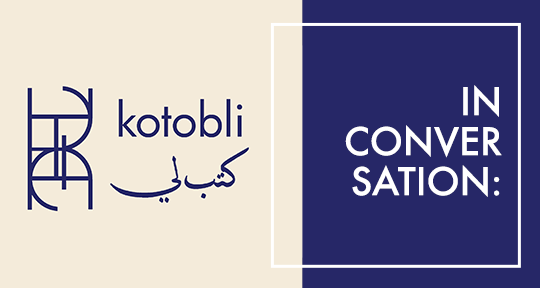kotobli is a book discovery platform dedicated to amplifying cultural and literary production from the Southwest Asia/North Africa (SWANA) region, with a special focus on independent publishers and marginalized writers. Curated with care according to geography, genre, and even theme, kotobli’s lists create opportunities for readers to encounter their next great read based on affinity and interest. I corresponded with the largely volunteer-run team behind kotobli on their conceptualisation of the website; in the process, I learned a lot about the difficulties underlying literary circulation in the Arab world, and the groundbreaking, creative ways in which small SWANA-based presses navigate them.
Alex Tan (AT): How did you begin to conceptualise kotobli? What distinguishes it from other book recommendation/discovery platforms like Goodreads, or even Bookstagram and Booktok accounts?
kotobli (k): A couple of years ago, we were getting frustrated with how difficult it is to look for good books about the Southwest Asia/North Africa (SWANA) region online. We found them to be badly categorised and difficult to sort through—and if we were looking for books in Arabic, they were almost impossible to find with only keywords and a topic in mind. Without knowing which titles to look for, we could hardly discover books worth reading.
On a brief visit to Lebanon in spring 2021, one of our founders, Omar, was determined to find Layla Baalbaki’s Ana Ahya, which he had discovered through an academic paper on feminism in Lebanon. After unsuccessful online searches and hopping from one bookstore to another, he finally found a used copy.
“It shouldn’t be this hard,” we thought. So we decided to make it easier. kotobli started as a platform to help readers find interesting books from the SWANA region, by topic, genre, geography, the identity of the authors, and through our curated reading lists. We named it kotobli—written in all lowercase letters as a nod to its Arabic origin “كتب لي”—which means “books for me”.
Throughout the process of collecting book information to populate our platform, we noticed deeply entrenched weaknesses in the publishing landscape of Arab countries: many publishers, especially smaller and older ones, do not have any digital presence; as such, many readers, especially in the Arab diaspora, are missing out on incredible books just because they would never show up in internet searches. This is where our project “Daleel el Nashirin” (Publishers’ Guide) started. With a grant from Culture Resource, we’ve been digitising the metadata for thousands of books and more than a dozen publishers in the Levant and North Africa. We’ve also been building virtual tools with publishers and authors participating in the process, giving them a free webpage on our website that they can fully control through a simple and safe content management system. Additionally, the publishers themselves have access to statistics that show how many readers look up their books on kotobli. READ MORE…


